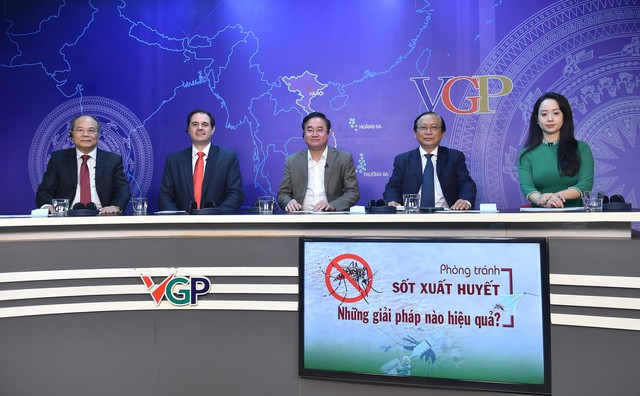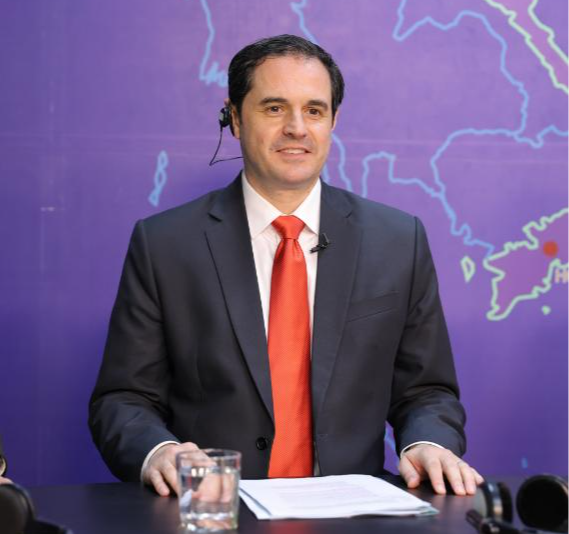Dengue fever prevention: What are the most effective solutions for Viet Nam?
VGP - Community awareness and education on dengue prevention alongside vaccination are the most effective strategy for dengue prevention in Viet Nam, said Professor, Dr. Vu Sinh Nam, senior advisor on Dengue Fever at the National Institute of Hygiene and Epidemiology (NIHE).

From left to right: Dr. Vu Sinh Nam, senior advisor on Dengue Fever at the National Institute of Hygiene and Epidemiology; Dion Warren, Area Head of India and Southeast Asia (I-SEA) at Takeda; Dr. Hoang Minh Duc, Director of the Department of Preventive Medicine under the Ministry of Health; Associate Professor, Doctor Nguyen Thanh Hung, Director of Children Hospital 1 join the talk themed "Dengue Fever Preventions - What Are the Effective Solutions?" hosted by the Viet Nam Government Portal, December 3, 2024. Photo: VGP
The Senior advisor made the point during the talk themed "Dengue Fever Preventions - What Are the Effective Solutions?" which was hosted by the Viet Nam Government Portal (VGP) on December 3 in Ha Noi.

Dr. Vu Sinh Nam, senior advisor on Dengue Fever at the National Institute of Hygiene and Epidemiology (NIHE) - Photo: VGP/Duong Tuan
Integrated dengue prevention
The senior advisor said that although the vaccination is an important tool, the strategy for dengue prevention must integrate various measures to optimize its effectiveness.
He also underlined the importance of other preventive measures including avoiding mosquito breeding areas, using mosquito repellents and protective clothing, installing window and door screens, encourage community clean-up efforts, practicing personal hygiene and immunity-boosting habits.
Nam said that "community education about the disease and preventive measures, such as using mosquito nets, wearing long sleeves, and self-protection during dengue outbreaks, is crucial.
"It is important to communicate a clear message: the dengue vaccine is an important preventive measure, but it should be combined with other methods to achieve the maximum effectiveness in controlling the disease," he added.
Enhancing epidemiological surveillance and regularly updating data is crucial to detect early signs of outbreaks, allowing for timely and effective preventive measures, he said.
Meanwhile, Dion Warren – area head of India and Southeast Asia (I-SEA) of Takeda quoted WHO's advance as saying that implementing the dengue vaccination for countries should integrate it with existing vector control measures to maximize effectiveness.
In the region, countries like Indonesia and Thailand, while using the vaccine, also apply a comprehensive approach. This includes addressing the escalating dengue risks and cases in Viet Nam, a country that listed as one of the most impacted from this disease by WHO.

Dion Warren – area head of India and Southeast Asia (I-SEA) of Takeda
Dengue vaccine R&D journey
According to Mr. Dion Warren, after years of relentless research, Takeda succeeded in developing a tetravalent dengue vaccine that can be administered to both children and adults, including individuals who have never been infected with dengue before as well as those previously infected.
Given the high technical and technological requirements involved in producing, storing, and transporting this vaccine, Takeda is committed to continuing substantial investments in manufacturing and distribution efforts to ensure the vaccine reaches countries in need of dengue prevention and protection.
Earlier, in May 2024, Takeda's dengue vaccine was approved by DAVfor use in Viet Nam by the Ministry of Health.
This is the first dengue vaccine to be approved in Viet Nam and has been available for administration since late September at public and private vaccination centers nationwide.

Dr. Hoang Minh Duc - Director of the Department of Preventive Medicine (Ministry of Health) - Photo: VGP/Duong Tuan
The epidemiology of dengue fever becomes more complex
Dr. Hoang Minh Duc - Director of the Department of Preventive Medicine under the Ministry of Health said that Viet Nam currently has two endemic diseases in the work of disease prevention and control that we are very concerned about, which are hand, foot and mouth disease and dengue fever.
Currently, there is no specific treatment for dengue fever, mainly symptomatic treatment. Dengue fever is caused by four different types of viruses and the development and immune response of each type is very complicated. Therefore, forecasting and responding to the epidemic situation caused by the types of viruses is very difficult.
Dengue mosquitoes have moved along the transportation and urbanization systems of the provinces, so dengue fever has reached the northern mountainous provinces.
To date, there is no specific treatment for dengue fever. Vaccines are available, but they are not widely used. Prevention and control of dengue fever currently rely mainly on vector control and changes in people's behavior and habits.
Dr. Hoang Minh Duc added that each year, Viet Nam has about 200,000 cases, creating a huge economic burden for the people. We have conducted a study to evaluate the financial costs of dengue fever prevention. Accordingly, each person hospitalized costs from VND 6-10 million , plus each hospitalized person needs a number of family members to accompany and take care of them, creating a huge economic and social burden.
According to the latest data from the Ministry of Health, by November 2024, Viet Nam recorded 114.906 dengue cases and 18 deaths. However, post-disaster conditions in the northern provinces, storms in the central region, and the rainy season in the south present ongoing risks for an increase in dengue cases./.

